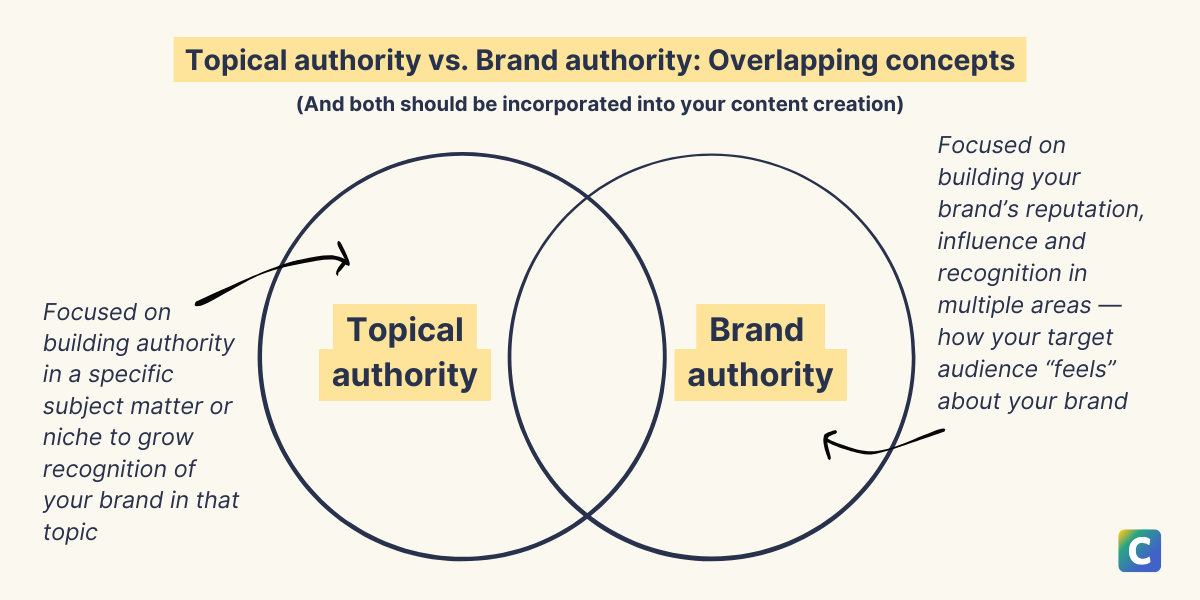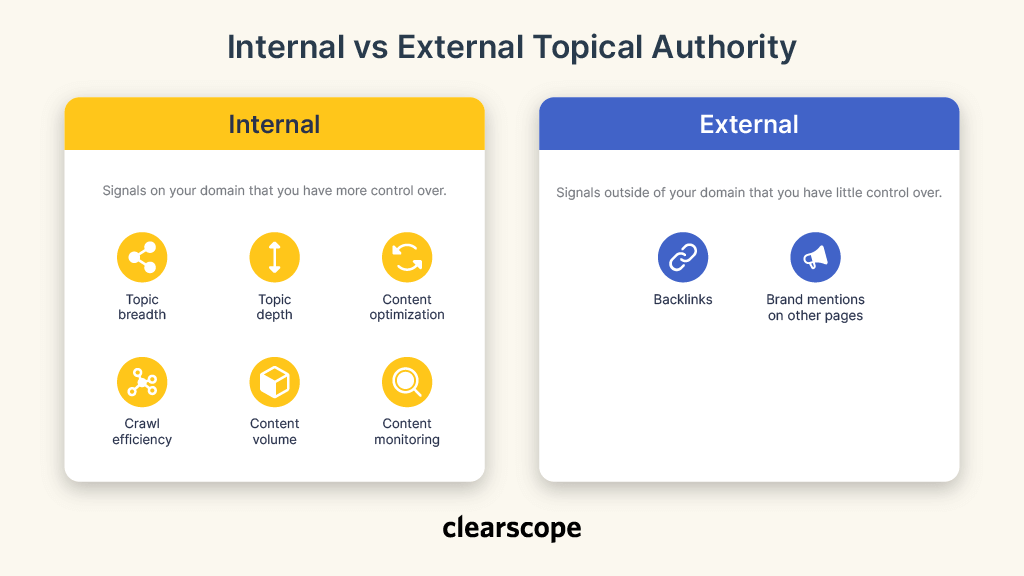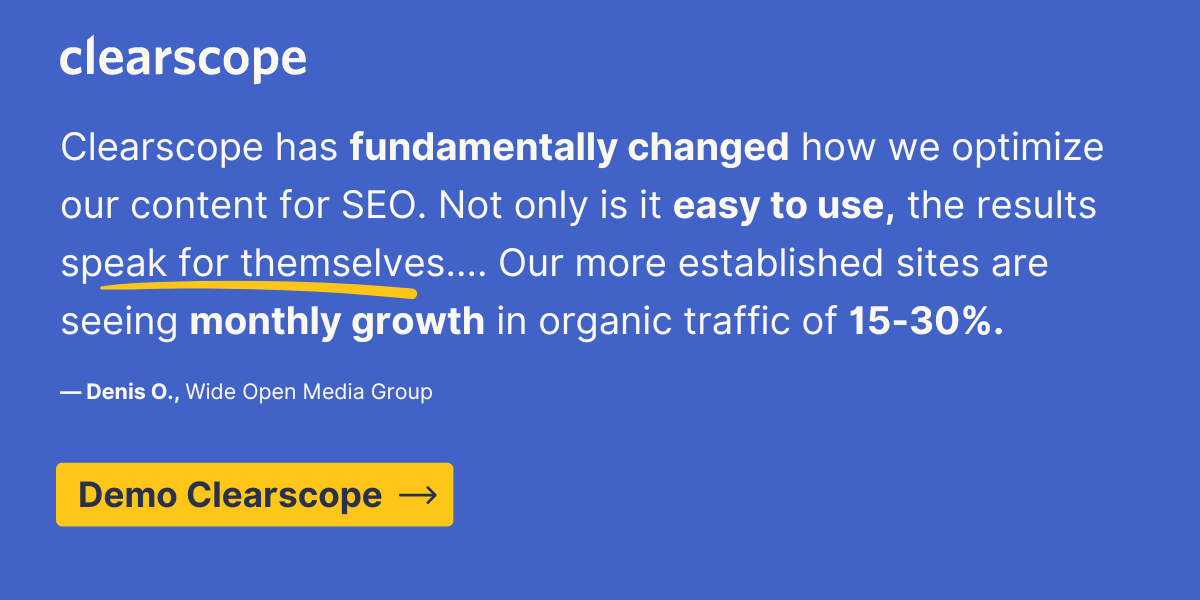Topical Authority: The What and Why
Topic: SEO
Published:
Written by: Bernard Huang
If you’re knee-deep in the SEO niche or just starting to get your bearings in digital marketing, you’ve likely heard about topical authority—and no, it’s not some fancy buzzword to ignore.
It’s a key unofficial ranking factor for search engines, especially Google Search, and applying it can be a real game-changer for your search engine optimization (SEO) and overall content marketing strategy.
In this article, I’ll break down what topical authority is, why it matters for your SEO strategy.
But if you’re already bought-in to the concept of topical authority and now you’re looking to build it? Check out How to build topical authority.
If you’re already building it and you want to measure topical authority, you’ll want to head over to Ways to measure topical authority instead.
Buckle up and get ready to dive into one of the most essential concepts in SEO today.
This is an excerpt from George Chasiotis' webinar on How to Build Topical Authority.
What is topical authority?
Let’s start with the basics.
Topical authority refers to how well a website covers a specific subject or particular topic with thorough, reliable, high-quality content.
Search engines like Google will often prioritize sites that demonstrate expertise in a niche because it helps them deliver the best, most authoritative content to searchers... content that is actually helpful and sharply meets user intent.
Think of your website as a go-to trusted source for a core topic and its related subtopics—when Google trusts that you’re an authoritative source in that subject, it rewards you with better search engine rankings in the SERPs (search engine results pages).
To build topical authority, your website’s content shouldn’t just scratch the surface.
And you’re not going to earn excellent long-term organic visibility by churning out AI-generated consensus content.
You need subject matter expertise, and you need information gain in your content.
PRO TIP: Information gain is a crucial practice that you need to know about in the era of AI-generated content. And it directly relates to topical authority. Read Topical authority vs. information gain (with examples) to learn more.
Instead of generic, high-level unhelpful content, your website should offer in-depth coverage of related topics and related keywords in your niche.
That way, you’re establishing that you’re the go-to resource in your industry, all while providing topical relevance and sharply matching search intent.
Before we move on, I need to answer a few common questions here about topical authority.

Are topical authority and brand authority different?
Yep. But they’re also related.
In short, topical authority is focused on a subject matter or niche, while brand authority is broader, relating to the brand's reputation and influence across multiple areas.
Here’s what’s up:
Topical authority refers to how well a website or entity is regarded as an expert or authoritative source on a specific subject or set of related topics. It’s built by consistently producing high-quality, in-depth content on a particular topic, answering key questions, and covering related subtopics and current events in your niche comprehensively.
Brand authority refers to the overall trustworthiness and recognition that your brand has in the marketplace across topics. It includes the brand's influence and perception in the minds of consumers and industry experts. Your brand authority isn't exactly limited to specific topics; it’s is more about the brand's overall market standing.

Topical authority and brand authority are overlapping but distinct concepts.
But it’s easy to understand why these two concepts would get confused: They feed into one another!
Grow your topical authority, and naturally, you’ll grow your brand authority over time.
Grow your brand authority, and topical authority may be easier and quicker for you to earn.
What’s website authority? Is that different than topical authority?
Website authority is also a different concept to topical authority—they aren’t synonymous.
Website authority is about the overall trustworthiness and credibility of the entire domain in the eyes of search engines like Google, while topical authority is more granular and topic-specific, focusing on how well the site covers a particular subject area.
Website authority a broader metric that encompasses multiple factors, including things like:
Domain age and history
Backlink profile
Overall content quality
User experience
Brand signals
The higher the website’s authority—according to search engines—the more likely the website can rank well.
What’s the difference between internal and external topical authority?
There are two sides to building topical authority: internal and external.

Internal vs. external topical authority signals.
Internal topical authority
This is where your website’s content really shines. Internal topical authority refers to how well-organized and detailed your content is across core topics.
Are you creating in-depth content on multiple related subtopics that tie back to a pillar page?
Are you structuring your topic clusters effectively? Strong internal authority also improves user experience, helping searchers find the piece of content they need quickly.
Are you providing subject matter expertise and unique perspectives to your content?
Internal authority is supported by semantic SEO principles, where content is optimized not just for keywords but for the meaning behind them, ensuring that your content aligns with the intent behind user searches.
On-page SEO also plays a key role in this by making sure your headings, URLs, and anchor text all contribute to your topical authority.
LEARN MORE: Why search intent optimization beats keyword optimization
External topical authority
External topical authority is about how other sites interact with your content.
This is where link building and earning high-quality backlinks from authoritative websites come into play.
These backlinks serve as “votes” or “endorsements,” showing search engines that your content is valuable and trustworthy.
To measure this, traditional SEO tools like Ahrefs, Semrush, and Moz are great for analyzing your backlink profile and tracking improvements in domain authority.
Social media mentions and shares can also assist in building external authority, especially when authoritative content is shared by subject matter experts in your industry.
How topical authority helps with SEO
Topical authority is a powerful factor that can influence search engine rankings.
Sites with strong topical authority are seen as trusted sources and tend to rank higher, attracting more organic traffic.
Over the years, Google’s algorithm updates have leaned toward honoring high topical authority through the following:
Hummingbird update in 2013 that stressed relevancy to a searcher's query
Helpful Content update in 2023 that prioritized content with firsthand experience, while deprioritizing duplicated and thin content
Helpful Content ranking system integration in 2024, which strengthened Google’s evaluation of your site’s helpfulness
By establishing topical authority, you help Google match your content to the search intent of users.
This means your site is more likely to rank for both broad topics and long-tail keywords.
This can:
Increase your visibility and traffic share
Drive more conversions
Help you stay ahead of competitors who don't provide authoritative content
Topical authority also helps align your content with Google’s Quality Rater Guidelines and E-E-A-T requirements (Experience, Expertise, Authoritativeness, Trustworthiness), which are key factors Google uses to evaluate the quality of content online.
Examples of how topical authority can help with content and SEO performance
Let’s break down some practical examples of what this could look like.
The first two examples here are generic.
The third example includes a real-life and anonymized version of a site that used topical authority to own their niche. (Video included.)
Example 1: SaaS Content Strategy
For a SaaS company focused on project management, building topical authority means creating core pages covering project management fundamentals, supported by case studies, blog posts, and detailed guides on related subtopics like resource allocation, time tracking, and automation.
By using keyword research to initially identify the right search terms, user intent, and topic phrasing to target, you can grow your authority form there by building out helpful content that directly relates to your target user.
Example 2: E-commerce site selling fitness gear
An e-commerce site can build topical authority by creating a series of articles and guides on how to choose fitness gear, proper usage, and workout routines.
Use internal links to connect relevant content, ensuring users can easily navigate between articles on yoga mats and workout techniques—and your actual products.
Example 3: B2C home improvement site selling high-end home upgrades
In this example from our in-house team, Amanda Johnson shares a site that she worked on where topical authority was built slowly at first, and then snowballed.
Paired with a clear understanding of how information gain can create lasting organic growth, Amanda built a topical-authority-centered strategy that caused traffic and conversions to grow past what was initially requested for this home upgrade company that operated in several U.S. regions.
Measuring and enhancing topical authority
I’m not going to do a deep dive on how to measure topical authority here. If you’re looking for a deep dive, jump ahead to learn multiple ways SEO pros can measure topical authority.
Ultimately, this is what you need to know at the beginning stages of this process:
Building topical authority takes time and requires regular monitoring and refining to implement a successful strategy.
A few tips to ensure you’re on the right track:
Keyword research: Identify the most relevant search terms and target keywords using keyword research tools, like Clearscope's Topical Explorations, Semrush, Ahrefs, and Moz. Some of these tools also monitor backlinks for your site and collective search volume for main topics.
Content creation: Clearscope guides your subject matter experts and content creators to regularly produce fresh, helpful content that covers a specific subject comprehensively and sharply meets your target search intent. Our industry-leading content optimization features help keep your content visible on SERPs.
Metrics: Use tools like Clearscope, Google Analytics, or Google Search Console to see how you’re performing for topics as a whole. With Clearscope, you can create custom content views (easily!) that allow for close monitoring of your content library by topics, internal linking opportunities, content health, and much, much more.

FAQs: Common questions we get on our team about topical authority
Q: How does domain authority impact SEO?
A: Domain authority reflects a site’s overall strength in SEO. A high domain authority often correlates with better rankings, especially when combined with strong topical authority.
Q: How long does it take to build topical authority?
A: It can take several months to over a year to see the full effects of building authority in your niche. By producing consistent high-quality content and focusing on both internal and external topical authority, you’ll gradually earn better search engine optimization results over time.
For some sites with established brand authority or website authority, you may be able to earn topical authority very quickly—especially for newer topics that are adjacent to your niche. And when I say quick, I mean I’ve seen it happen in 3 months or less.
If you’re a brand-new site or just starting to invest in content marketing, it will take some time not only to rank for relevant keywords, but also to earn “SERP real estate” in those relevant topics that you’re targeting.
Additional resources and citations
For further reading, check out these resources:
The latest update to the quality rater guidelines from the Google Search Central Blog
7 Confirmed Google Ranking Factors from the Ahrefs blog
Understanding news topic authority from the Google Search Central Blog
Contributing authors and updates
The original version of this article was published November 8, 2022. It was revised on October 23, 2024, to include updated education on current best practices by the Clearscope team.
How to Create the Perfect SEO Content Brief in the Era of Ai-Assisted Content
Discover how to craft SEO content briefs that focus on people-first content, even in the AI era. Learn to streamline content production and boost organic traffic with actionable, user-centered strategies.
Read moreKeyword Mapping: What It Is and How to Map to Your Purchase Journey
Learn what keyword mapping is and how to implement it for your website.
Read moreHow Long Does It Take to Rank In Google With SEO Techniques?
How long does it take to rank in Google? Using SEO techniques, it can take 3-6 months to rank an article depending on the competition for your keyword.
Read more